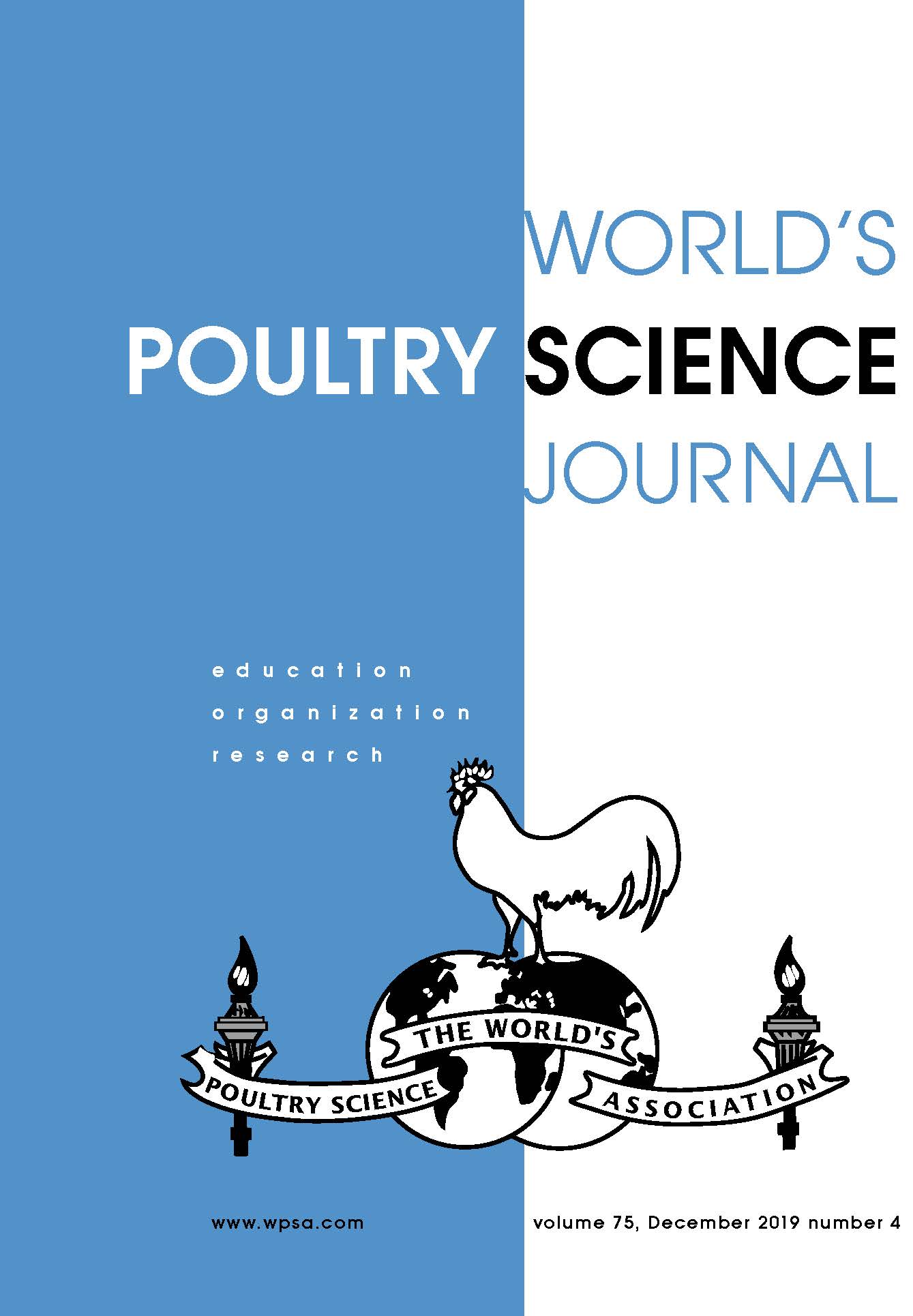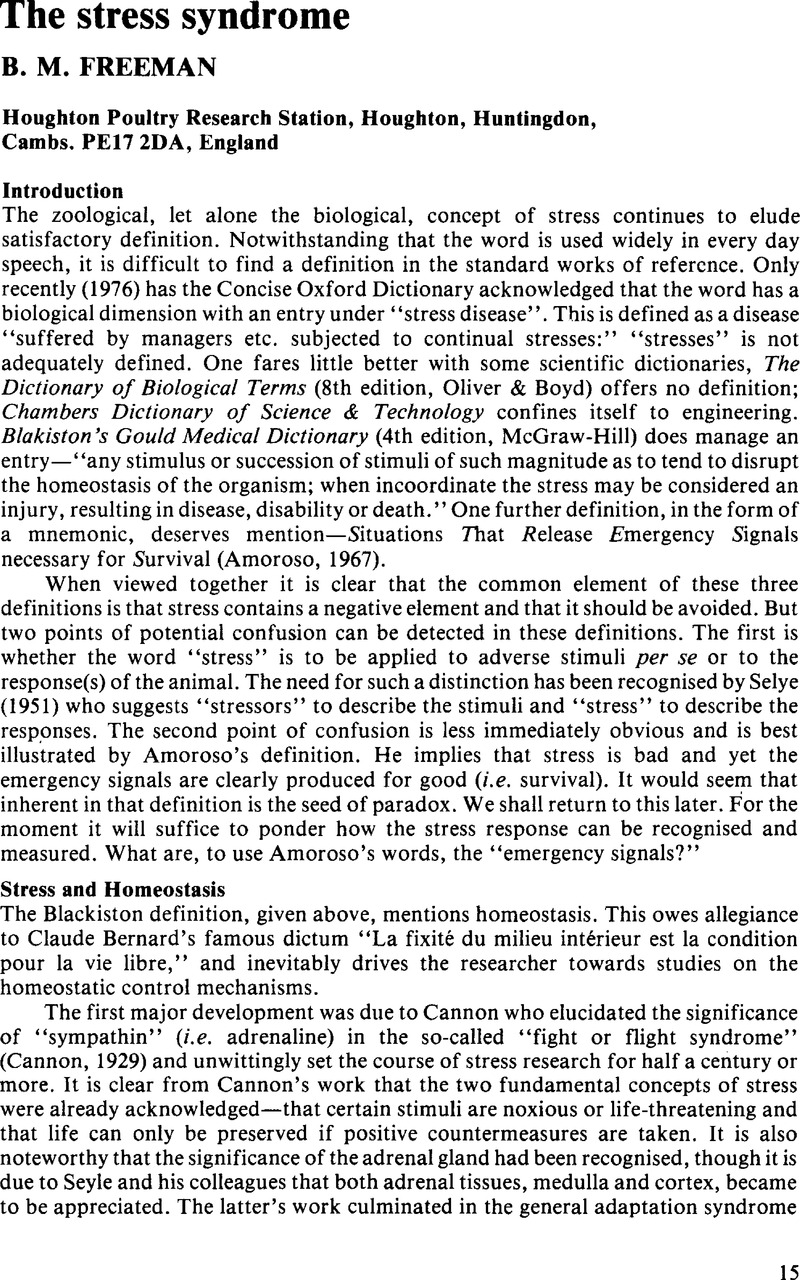Crossref Citations
This article has been cited by the following publications. This list is generated based on data provided by Crossref.
Gross, W.B.
Domermuth, C.H.
and
Siegel, P.B.
1988.
Genetic and environmental effects on the response of chickens to avian adenovirus group II infection.
Avian Pathology,
Vol. 17,
Issue. 4,
p.
767.
Siegel, Paul B.
1989.
The genetic‐behaviour interface and well‐being of poultry1.
British Poultry Science,
Vol. 30,
Issue. 1,
p.
3.
Siegel, P. B.
Gross, W. B.
and
Dunnington, E. A.
1989.
Effects of dietary corticosterone in young leghorn and meat‐type cockerels.
British Poultry Science,
Vol. 30,
Issue. 1,
p.
185.
GRAY, H.G.
PARADIS, T.J.
and
CHANG, P.W.
1989.
Research Note: Physiological Effects of Adrenocorticotropic Hormone and Hydrocortisone in Laying Hens.
Poultry Science,
Vol. 68,
Issue. 12,
p.
1710.
Knowles, T.G.
and
Broom, D.M.
1990.
The handling and transport of broilers and spent hens.
Applied Animal Behaviour Science,
Vol. 28,
Issue. 1-2,
p.
75.
Maxwell, M.H.
Robertson, G.W.
Anderson, I.A.
Dick, L.A.
and
Lynch, M.
1991.
Haematology and histopathology of seven-week-old broilers after early food restriction.
Research in Veterinary Science,
Vol. 50,
Issue. 3,
p.
290.
Donaldson, W.E
Christensen, V.L
and
Krueger, K.K
1991.
Effects of stressors on blood glucose and hepatic glycogen concentrations in turkey poults.
Comparative Biochemistry and Physiology Part A: Physiology,
Vol. 100,
Issue. 4,
p.
945.
Zayan, René
1991.
The specificity of social stress.
Behavioural Processes,
Vol. 25,
Issue. 2-3,
p.
81.
Mitchell, M A
Kettlewell, P J
and
Maxwell, M H
1992.
Indicators of Physiological Stress in Broiler Chickens During Road Transportation.
Animal Welfare,
Vol. 1,
Issue. 2,
p.
91.
Spinu, M.
Degen, A. A.
and
Rosenstrauch, A.
1993.
Effect of warm drinking water on the performance and immunological responses of broiler breeder hens raised at low air temperatures.
British Poultry Science,
Vol. 34,
Issue. 2,
p.
361.
Spinu, M.
and
Degen, A. A.
1993.
Effect of cold stress on performance and immune responses of Bedouin and white leghorn hens.
British Poultry Science,
Vol. 34,
Issue. 1,
p.
177.
Webster, A. J. F.
Tuddenham, A.
Saville, C. A.
and
Scott, G. B.
1993.
Thermal stress on chickens in transit.
British Poultry Science,
Vol. 34,
Issue. 2,
p.
267.
Donaldson, W.E
Clark, J
and
Christensen, V.L
1994.
Protein, lipid and glycogen stores in newly-hatched turkey (Meleagris gallopavo) poults as affected by post-hatch Stressors and holding time.
Comparative Biochemistry and Physiology Part A: Physiology,
Vol. 107,
Issue. 3,
p.
559.
Rosales, A. Gregorio
1994.
Managing Stress in Broiler Breeders: A Review.
Journal of Applied Poultry Research,
Vol. 3,
Issue. 2,
p.
199.
Jensen, P.
and
Toates, F.M.
1997.
Stress as a state of motivational systems.
Applied Animal Behaviour Science,
Vol. 53,
Issue. 1-2,
p.
145.
Onbaşılar, E.E.
and
Aksoy, F.T.
2005.
Stress parameters and immune response of layers under different cage floor and density conditions.
Livestock Production Science,
Vol. 95,
Issue. 3,
p.
255.
Olanrewaju, H.A.
Wongpichet, S.
Thaxton, J.P.
Dozier, W.A.
and
Branton, S.L.
2006.
Stress and acid-base balance in chickens.
Poultry Science,
Vol. 85,
Issue. 7,
p.
1266.
Onbaşılar, E.E.
and
Erol, H.
2007.
Effects of Different Forced Molting Methods on Postmolt Production, Corticosterone Level, and Immune Response to Sheep Red Blood Cells in Laying Hens.
Journal of Applied Poultry Research,
Vol. 16,
Issue. 4,
p.
529.
Koelkebeck, K.W.
and
Anderson, K.E.
2007.
Molting Layers—Alternative Methods and Their Effectiveness.
Poultry Science,
Vol. 86,
Issue. 6,
p.
1260.
Shini, Shaniko
Kaiser, Pete
Shini, Agim
and
Bryden, Wayne L.
2008.
Biological response of chickens (Gallus gallus domesticus) induced by corticosterone and a bacterial endotoxin.
Comparative Biochemistry and Physiology Part B: Biochemistry and Molecular Biology,
Vol. 149,
Issue. 2,
p.
324.



